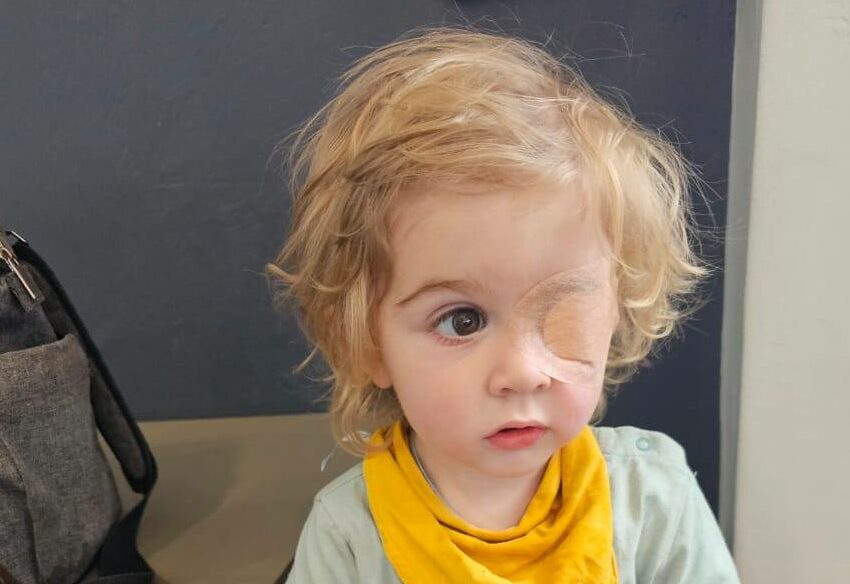
In a heartfelt Facebook post, a mother from Windhoek in Namibia shared her devastating experience to raise awareness about the dangers of allowing others to kiss infants.
Michelle Saaiman’s cautionary tale centres around her toddler, who developed a severe herpes infection in his left eye after being kissed by an infected person.
The mother recounted how, seven months ago, her son, then just 16 months old, showed signs of an eye infection.
After initial treatment with antibiotic drops, the condition rapidly deteriorated, leading to a visit to an ophthalmologist. There, her worst fears were confirmed: her child was diagnosed with a herpes virus, the same strain that causes cold sores.
‘I’ve never heard of something so ridiculous. I mean, really, a fever blister growing on his cornea!?” she lamented in her post.
Despite extensive treatment, including surgeries, hospitalisations and consultations with various specialists, her son has lost most of his vision and sensation in his left eye.
‘I won’t go into too much detail about all the treatment and trauma, but after thousands of dollars of medication, two trips to the theatre, hospitalisation, biopsy, specialist visits (even a paediatrician from America that assisted), and an amazing pharmacist who had to ‘make’ special medicine for our baby’s condition, we eventually managed to get the virus in remission.
‘The scariest part is that if left untreated, this virus can migrate to the brain. Many other complications can also ensue. As Herpes Virus cannot really be ‘cured’, just ‘managed’, it tends to flair up every now and again, which is unfortunately what happened to our baby,’ Saaiman said.
She added: ‘Due to the damage caused to the eye, he developed a hole (open wound) in his eye, a ‘cornea defect’, and our baby’s defect was 4mm in size. It’s the most traumatic experience to look at your baby, and literally see a 4mm open wound in his eye, which is so clearly visible.
‘It’s been confirmed by several doctors that the Herpes Virus could only have been transferred by someone who had an active fever blister, kissing your baby on (or close) to the eye, or on his hand whereafter he touched his eye.’
‘Our baby lost most of his vision and sensation in his left eye. Due to the open wound, the eye was/is infected constantly. Also, if we can’t get the wound to heal, he will (not can, but WILL) be losing the eye in totality.’
Currently, the toddler has undergone the first of three planned surgeries in South Africa, with hopes of saving his eye through nerve harvesting and, potentially, a cornea transplant, Saaiman said.
His eyelids are stitched closed to protect the injured eye, and the family has come to terms with the possibility that he may be permanently blind in that eye.
In sharing her story, Saaiman said she aims to educate others on the serious consequences of seemingly harmless actions, urging all parents to prevent anyone from kissing their babies.
‘Such a silly virus caused so much trauma and damage; it’s just not worth it!’ she said.
A maternal-fetal medicine expert and obstetrician-gynaecologist at Universitas Hospital in Bloemfontein, Dr Rethabile Khalema, confirmed that kissing is a frequent way the herpes virus is transmitted.
‘Herpes is a common name used to describe a virus that causes different types of sores on the human body. The scientific name is herpes simplex, with type 1 responsible for what we commonly call cold sores around the mouth,’ Times Live quoted Khalema as saying.
‘The transmission of the virus is through contact with lesions or sores containing the virus or through oral secretions of people carrying the virus. Herpes simplex 2 causes genital herpes, which are sores in the private areas of women and men.’
Khalema explained the distinction between herpes simplex, which commonly causes cold sores, and herpes zoster, a reactivation of the chickenpox virus that can affect immunocompromised individuals.
She stressed the importance of preventing transmission to vulnerable groups, especially children, by avoiding contact with active sores and covering them to prevent the spread of secretions.
Compiled by: Betha Madhomu
First published by African Insider
Also see: Understanding the causes of Marburg, the bleeding eye virus that’s claiming lives in East Africa




